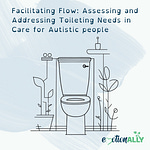Essentially managing personal hygiene involves the physical ability to get in and out of the shower or bath safely, being able to reach all of your body parts including your hair to wash it and being able to tolerate the sensory experience of a bath or a shower (some people love it and some people hate it, whether that be the sensation of the water from the shower head, the potential for difficulty with transitions between temperatures, or being very uncomfortable when naked there’s lots of sensory “stuff” when we get washed).
I would also be looking for how regularly people brush their teeth to see if there is any risk of infection or pain from tooth decay. This can be particularly problematic for some people due to the strong taste of toothpaste, the feeling of the bristles, an active gag reflex or trauma around oral care.
It is important if there are difficulties maintaining personal hygiene that we check that people are aware of the risks including increased risk of infections and spreading infections to others, skin problems, body odour, dental issues such as tooth decay and the potential negative impact on self-esteem or social isolation. Personal hygiene is really about preventing health issues.
If someone can physically attend to their hygiene but struggles with executive function: such as feeling overwhelmed by starting a personal hygiene task, difficulty doing things in the right order, trouble gathering the items necessary for personal care tasks, time management of forgetfulness might be better described as a support need (depending on the level of difficulty and how frequently someone manages to attend to personal care).
Support needs could be more successfully addressed by employing the following strategies rather than providing a carer or a personal assistant to support with washing and showering, which many people find intrusive. It is important that you understand that difficulties with hygiene as a result of executive functioning difficulties require understanding and support and should not be dismissed or invalidated as laziness or poor motivation.
Support needs may be better addressed by the following:
• Visual aids, picture charts or step-by-step instructions.
• Setting reminders on your phone or using apps such as Finch and Habitica (available with free versions in your app store) or a paid app such as Brain in Hand.
• Breaking down tasks into smaller steps.
• Having a basket ready with all necessary equipment.
• Habit stacking, by linking hygiene tasks into activities that are already part of a person’s daily routine.
• Use products with preferred scents, or use music or a favourite towel to make it a pleasant sensory experience. Or uses unscented products and waterproof headphones/ ear protectors being overstimulated is part of the problem.
When we are assessing this particular care needs there are some conditions and behaviours more commonly associated with Autistic people than in the general population that we need to take into account.
1. Consider sensory sensitivities. For example, the sensation of water on the skin, the sound of running water, or changes in water temperature can be overwhelming or aversive.
2. Executive functioning differences can mean difficulty initiating tasks, difficulty planning and sequencing steps, difficulties with memory and organization and difficulty judging how long a hygiene task should take or fitting it into a daily schedule.
3. People may not always notice when they are not clean due to a lack of awareness of appearance or body odour or may not find it a priority. It is important to understand the risks and benefits of personal hygiene so people can make an informed decision about personal care. Reduced ability to recognize internal body signals might lead to a decreased awareness of the need for hygiene (e.g., feeling dirty).
4. Autistic people can struggle with change and transitions, and this may result in resistance to new hygiene products or routines, or difficulty adapting to changes in environment such as using different bathrooms.
5. Fine motor skills needed for tasks like brushing teeth or fastening buttons on clean clothes can be a challenge.
6. It is also worth considering other health and neurodivergent conditions that affect mobility that are experienced at higher rates by Autistic people such as dyspraxia (Developmental coordination disorder), joint hypermobility and Ehlers-Danlos Syndrome and epilepsy, which can make balance more difficult. (And therefore, personal hygiene tasks more risky).
Key areas of personal hygiene to think about
1. Can you shower or bathe independently (without risk of falls or accidents such as scalding)?
2. Can you wash your hair independently?
3. Can you dry yourself independently?
4. Do you brush your teeth at least once a day? Have you had any tooth pain of bleeding gums?
5. Do you have a whole-body wash at least two or three times a week?
6. Do you have difficulty caring for your appearance?
7. Do you have difficulty motivating yourself to attend to personal care?
Remember
There isn't a single, clear-cut "score" or level of need that automatically triggers support. However, as a general guideline a care need in maintaining personal hygiene will meet the threshold for provision of care if it impacts the following.
• Personal dignity: being able to manage their personal cleanliness and appearance in a way that feels comfortable and respects their dignity, avoiding feelings of shame or embarrassment.
• Physical and mental health and emotional well-being: ensuring adequate hygiene to maintain physical health (preventing infections, skin breakdown, etc.) and mental well-being (avoiding social isolation, low self-esteem, and anxiety related to their appearance or odour).
• Protection from abuse and neglect: ensuring they are not at risk of harm due to an inability to maintain personal hygiene, which could lead to neglect or exploitation. If someone is reliant on others for their personal care, and those individuals fail to provide adequate support with hygiene, this constitutes neglect. For example, a caregiver consistently failing to assist with washing, changing soiled clothes, or oral care could lead to harm.
• Control over day-to-day life (including over care and support, or support and safeguarding): having choice and control over how their personal hygiene needs are met, including the timing, methods, and products used.
• Suitability of living accommodation: ensuring their living environment supports their personal hygiene needs (e.g., access to appropriate washing facilities, clean clothing storage).
• Furthermore, the inability to manage personal hygiene independently may demonstrably hinder their ability to participate in work, education, or social activities.
When is occupational therapy preferable to standard care provision
Occupational therapy (OT) is generally preferable to standard social care provision for managing and maintaining personal hygiene when the primary barriers are related to an individual's functional abilities, sensory processing, or the need for adaptive strategies and equipment. Social care often focuses on providing direct assistance with tasks, whereas OT aims to enable the individual to become as independent as possible by addressing the underlying challenges.
In short when the main problems are about someone's physical abilities, how they experience touch, sounds, and other sensations, or when they need special ways and tools to help them (that's what we mean by adaptive strategies and equipment) and OT referral may be a better choice. Regular social care often focuses on just doing the tasks for someone, but OT tries to help the person become as independent as possible by tackling the reasons why they're finding things difficult.













Share this post